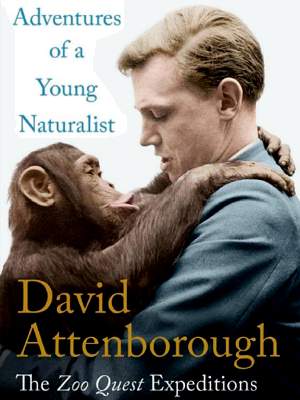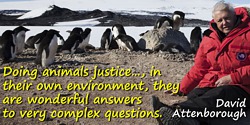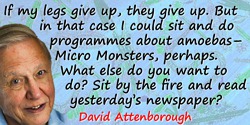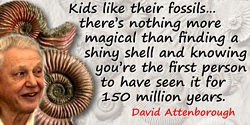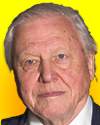 (source)
(source)
|
Sir David Attenborough
(8 May 1926 - )
English naturalist and broadcaster whose distinguished career in broadcasting spans more than a half-century. His Zoo Quest television series that began in 1952 ran for ten years, and was just the beginning of a life-long passion for presenting natural history television series from all parts of the world.
|
Attenborough’s TV Debut on Zoo Quest
21 December 1954
A seminal event that redefined the nature documentary genre
Sir David Attenborough’s television debut on 21 Dec 1954, on the BBC program “Zoo Quest,” marked more than the commencement of an illustrious broadcasting career; it signified a transformation in wildlife documentaries that would captivate and educate millions worldwide. Few could have foreseen the profound and lasting impact this pioneering program would have on the way we view our natural world.
“Zoo Quest” was an innovative fusion of adventure, scientific exploration, and wildlife documentary, a concept previously unseen on television. Attenborough, as the host, led viewers on extraordinary expeditions to diverse global locales, including the lush jungles of Guyana, the vibrant islands of Indonesia, and the remote regions of Paraguay. These journeys were not without challenges; navigating dense foliage, unpredictable weather, and encounters with potentially dangerous wildlife were all part of the quest to bring the wonders of the natural world into viewers’ living rooms.
The series’ first installment, “Zoo Quest to West Africa,” was a monumental achievement. It unveiled the exotic wildlife of Sierra Leone and Guinea to British audiences, showcasing chimpanzees, pythons, and rare birds. Attenborough’s innate ability to convey the enchantment of these creatures with palpable enthusiasm and respect made these early broadcasts mesmerizing. His style, characterized by a gentle demeanor and clear articulation, coupled with a talent for making complex scientific concepts both accessible and engaging, quickly endeared him to viewers.
A crucial aspect of “Zoo Quest” was its focus on conservation and education. Attenborough did not merely present animals as specimens but as integral parts of their ecosystems, deserving respect and protection. His storytelling was not limited to wildlife alone; it included the cultures and traditions of the local people he encountered, highlighting the interconnectedness of humans and nature.
Technologically, “Zoo Quest” was ahead of its time, being among the first to employ color film in wildlife documentaries. This advancement brought the true vibrancy of the natural world to the screen, enhancing the visual storytelling with richer, more detailed imagery of animals and landscapes.
Attenborough’s influence extends far beyond the screen. His work raised awareness about endangered species and the urgent need for sustainable practices to conserve our planet’s biodiversity. His documentaries have served as a call to action, inspiring generations to engage in environmental stewardship.
Throughout his career, Attenborough has received numerous accolades for his contributions to broadcasting and conservation. However, his true legacy lies in the global shift in environmental consciousness he helped foster—a testament to the power of media to inspire and drive change.
Thus, David Attenborough’s debut on television was a seminal event that redefined the nature documentary genre and played a vital role in shaping global environmental consciousness. But also, his enduring influence is a reminder of how media can educate and motivate people to engage with and protect our natural world.
- Science Quotes by Sir David Attenborough.
- 8 May - short biography, births, deaths and events on date of Attenborough's birth.
- The Last Wave — The Panamanian Golden Frog, as described by David Attenborough in a short excerpt from his Memoirs (2009)
- Life on Air: Memoirs of a Broadcaster, by David Attenborough. - book suggestion.
- Booklist for David Attenborough.
